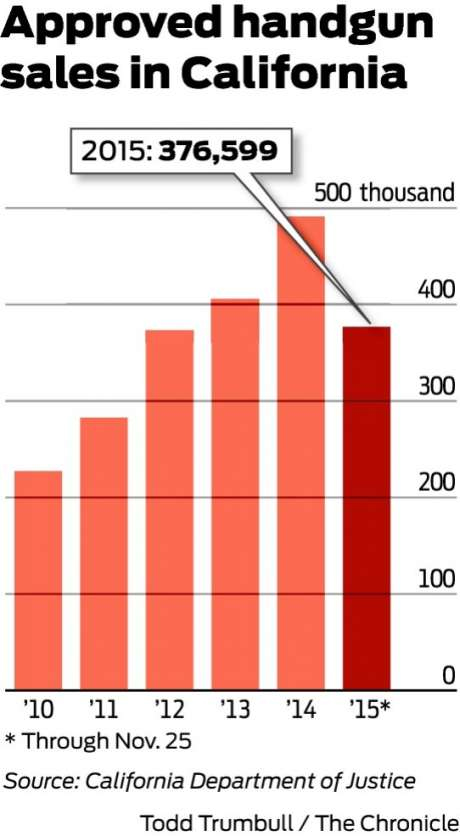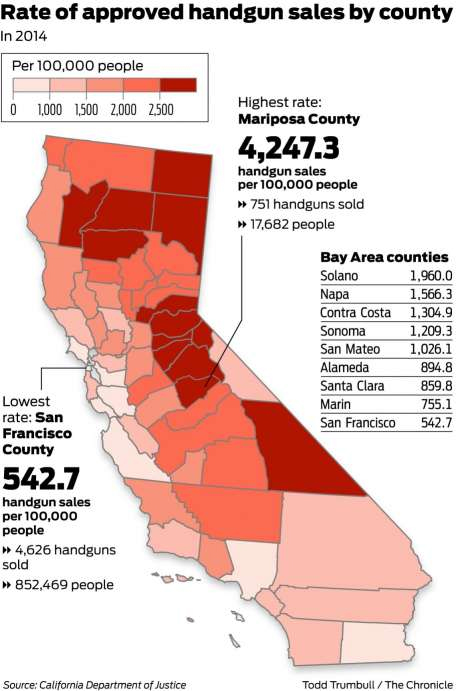Gun Purchases Up Despite California’s Strict Firearms Laws

By Joaquin Palomino • December 26, 2015
Even as California has enacted some of the toughest gun laws in the country, firearm purchases in the state have steadily increased.
The number of handguns sold in California more than doubled between 2010 and 2014, with nearly a half-million transactions being recorded last year, according to state Department of Justice records. As of November — before Black Friday or the San Bernardino massacre, which caused a reported rush on gun stores — 376,600 handguns had been purchased in the state. An additional 6,230 sales were pending, the vast majority of which are expected to be approved.
Over the past five years, California has bolstered its already strict gun control laws, passing legislation that, among other things, bans people from openly carrying unloaded guns in public and allows law enforcement to seize or prevent sales of firearms to people who are considered to be in danger of harming themselves or others. (The law, signed in 2014, goes into effect Jan 1.)
The trend, some experts say, illustrates what gun control can achieve, and what it can’t.
“It shows that smart, strong gun safety laws can co-exist with a robust marketplace for firearms,” said Ari Freilich, a staff attorney at the Law Center to Prevent Gun Violence, which lobbies for comprehensive gun control measures. “California has successfully placed meaningful curbs on dangerous people accessing firearms, while also allowing law-abiding citizens to access them.”

Leading Counties
Handguns have become particularly popular in the San Joaquin Valley. From 2010 to 2014, purchases increased between 163 and 224 percent in Kings, Tulare, Merced, Fresno and San Joaquin counties. Alpine County also saw a large jump, but its population — and subsequently the number of firearm sales — remained relatively small.
In the Bay Area, handgun sales rose in all nine counties, but only Solano and Santa Clara had increases above the state average of 116 percent.
Sales of long guns, which include rifles and shotguns, were excluded since the state has uniformly tracked them only since 2014.
By population, sales were highest in the Sierra and Northern California last year. Mariposa County topped the list, recording about 4,250 transactions per 100,000 residents. San Francisco — which saw its last remaining gun shop close in October — recorded the lowest rate: roughly 540 sales per 100,000 residents. The state average was 1,265 sales per 100,000 residents.
This year, the number of background checks performed in California also hit an all-time high, topping 1.5 million as of Nov. 30. The figure includes checks for both handgun and long gun sales, as well as those required for a firearm permit.
State Laws
California’s increase mirrors national trends, but what sets it apart is its rigid gun control laws. It’s one of just eight states, along with the District of Columbia, that require universal background checks for firearm sales, one of four states with a mandatory waiting period for gun purchases, and one of four that prohibits selling guns to people convicted of assault or battery, according to NPR.
“In gun policy, California is a model citizen, but things aren’t perfect,” said John Donohue, a Stanford law professor and economist. “The state is grappling with the difficulty of navigating constitutional rights and the need for safety.”

Fewer Crimes
The increase in handgun sales coincides with a dip in gun-related crimes. The number of aggravated assaults in California involving a firearm dropped from more than 23,000 in 2005 to less than 16,000 last year. The number of gun-related murders fell from 1,845 to 1,169 over the same time period.
While gun crimes are down both in California and nationwide, there’s a perception, and some evidence, that mass shootings are on the rise.
“The actual violent crime rate is different from the perception of vulnerability,” said Chuck Michel, a civil rights attorney and president of the California Rifle and Pistol Association, a state lobbying group associated with the NRA. “You never know where a terrorist may strike, and police can’t protect you from the lone wolf types; you need a gun to protect yourself.”
Fear of incidents like the mass murders in San Bernardino — in which attackers used legally purchased but illegally transferred and modified weapons to kill 14 and injure 22 — may be fueling the state’s gun industry.
Bay Area Firearms, a training center in Burlingame that teaches people how to handle guns, booked $3,000 worth of classes in a single day after the San Bernardino attack, according to its owner, Scott Jackson. Registrations increased by 900 percent. “People are lined up now every day, asking for AR-15s, handguns, shotguns, rifles,” he said. “Their eyes have been opened.”
While more handguns are being sold in California, it doesn’t necessarily mean there are more gun owners. Some researchers have found the number of American households that own a firearm is at a 40-year low, even though transactions are climbing. This suggests a smaller group of people is collecting more weapons.
“I don’t believe the shooting sports are growing at all,” said Tom Frenkel, vice president of the Richmond Rod and Gun Club, which has roughly 2,000 members and has operated in the shadow of Chevron’s Richmond refinery for decades. “I think people that want to shoot are paranoid they’re going to get shut out and they’re stocking up on firearms.”
Wary Of Restrictions
Some gun owners are nervous about proposed legislation that has gained momentum after the San Bernardino attack. Lt. Gov. Gavin Newsom is backing a proposition that, if placed on the 2016 ballot and approved by voters, would require background checks for people buying ammunition and require that high-capacity magazines be turned over to law enforcement. The proposition would also require gun owners to report lost or stolen firearms. Stolen weapons have been used in several recent Bay Area killings.
Many experts think the fear of more restrictive gun control measures fuels sales, but the impacts aren’t necessarily being felt at the Richmond gun club. While membership is growing, Frenkel attributes it less to an expanding customer base and more to the uncertain future of other Bay Area ranges, some of which have recently closed.
He worries that the attacks in San Bernardino will further ostracize the small shooting community in the area.
“That’s what pisses me off, getting lumped together with crazy people when I’m not,” he said. “People that commit gun violence are a very small percentage of the community. There are millions of others just like me: I’m 75, I started shooting when I was 11, and I never thought about hurting anyone with a gun.”
Joaquin Palomino is a San Francisco Chronicle staff writer. E-mail: jpalomino@sfchronicle.com Twitter:@JoaquinPalomino
Click here for the original article on the San Francisco Chronicle.
By Joaquin Palomino • December 26, 2015
Even as California has enacted some of the toughest gun laws in the country, firearm purchases in the state have steadily increased.
The number of handguns sold in California more than doubled between 2010 and 2014, with nearly a half-million transactions being recorded last year, according to state Department of Justice records.

Leave a Reply